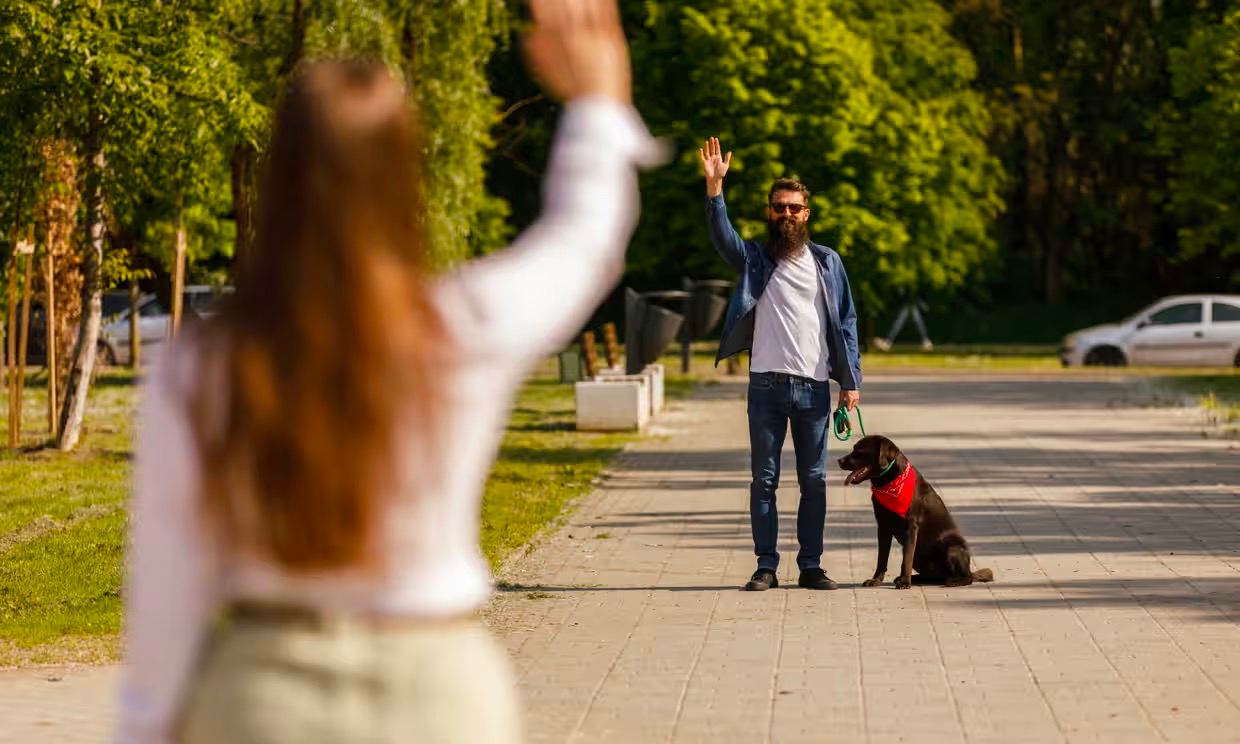A Swedish city is encouraging its residents to say hello to each other, which sounds like hell for most British people. But never fear – help is at hand
In a development more chilling than its -10C temperature, the Swedish city of Luleå is encouraging people to say hello to each other. The Säg hej! campaign is trying to combat social isolation and loneliness during the long, dark Nordic winter by making people feel “more seen and a bit more like you belong”, according to the campaign’s coordinator, Åsa Koski. I admit that sounds admirable, but it is also horrifying.
I consume a vast amount of energy when navigating interactions with strangers and I am pretty sure that is standard in the UK. Maybe it’s different in Sweden (or perhaps not, given that they found 2-metre social distancing too close for comfort), but over here we live by the motto: “Why make things simple when you could become ensnared in a web of awkwardness?” The Luleå campaign has made me realise we need help. So, having consulted widely, here are my draft guidelines for one-on-one stranger greetings.
In the few seconds before you cross paths with someone, you must ask yourself a series of questions. First, are you in a city centre? If so, do not greet unless an exemption applies. These include the dual dog exemption (if you are both walking dogs, a nod, a smile or a brief vocal greeting is a polite necessity) and the single dog or shoulder parrot exemption (if a passerby is accompanied by one of these, you may greet them effusively). This is not an exhaustive list: something like an outrageously excellent coat, a miniature horse or a ferret in a backpack would also qualify. Basically, if a stranger has something that instantly makes you want to approach them, then greeting is permitted.
If you are not in a city centre, you need to get granular. Country footpaths are easy: say hello and add something like: “Lovely day”, or: “Not much further!” I have the manners of a snapping turtle, but even I get huffy if someone breaches this social contract.
Below a certain population threshold, greeting becomes obligatory everywhere. I think it’s about 500, but when I raised the topic on Instagram, someone told me “country people do it” in Devizes, England (population: 19,472), while in Marlborough, England (population: 9,129), they don’t; clearly, Wiltshire has its own rules.
Generally, if there are three shops or fewer, or it’s a place where a stranger would be instantly identified, offer a cheery: “Morning!” or similar. A smile is inadequate and will send the Neighbourhood Watch WhatsApp group wild.
In larger places, it’s site-specific. Town centres are like cities, except for parks: larger ones don’t carry the same weight of social obligation as country paths, but smaller ones might; don’t get caught out. Quieter suburbs or streets may have specific rules. There is a cul-de-sac near me that seems to have adopted its own universal “hello” convention that runs against the wider community norm. It’s baffling but pleasant, like travelling back to the 50s.
Generally, there are two complicating factors that can derail your greeting: fear and fluidity. In an isolated environment, if you appear to be the larger person, it’s polite to offer the kind of greeting that defuses any anxiety about whether you are planning to do any murdering today. There is even a TikTok genre of men saying hello in non-threatening ways, such as: “My beige flag is I’m a Swifty,” and: “My TikTok algorithm is mainly gardening makeovers.” Then, a stranger greeting is appropriate only if continued motion away from each other can be guaranteed, as several people emphasised to me: there must be no risk of getting trapped in conversation. If you can’t say hello and keep walking – think: traffic lights, station platforms and bus stops – then zip it.
Two final points. First, on 25 December and 1 January, anyone who does not greet strangers with something seasonally appropriate is a monster. Second, if you can’t work out how to navigate a situation, don’t pretend you need to look at your phone; this is the last refuge of the scoundrel. Instead, smile vaguely. It’s polite, but also offers plausible deniability if you have misread the situation. I have got it wrong enough times to know.








